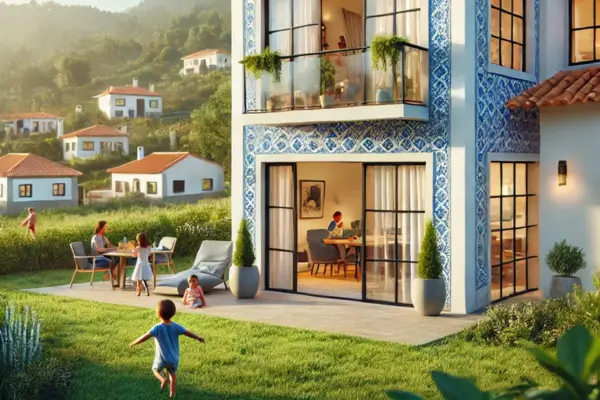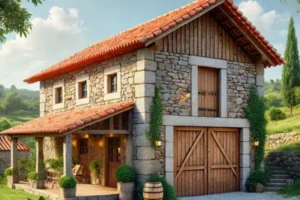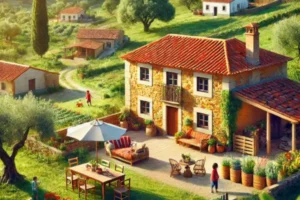Portugal has become a dream destination for expatriate families seeking a fresh start in Europe. With its sunny climate, welcoming communities, and exceptional quality of life, it’s no surprise that more families are choosing Portugal as their new home. Beyond its scenic beauty, the country offers practical advantages like excellent schools, a safe environment, and access to affordable healthcare—all crucial for family life.
For those planning the move, housing is often the first and most important consideration. Finding a home that balances affordability with functionality is key, especially for families with growing needs. In Portugal, the housing market presents a unique mix of old-world charm and modern convenience, making it a standout option for expatriates seeking a budget-friendly yet comfortable lifestyle.
What makes Portugal truly special is how tradition and innovation seamlessly blend in its architecture and housing trends. From thoughtfully renovated farmhouses to contemporary eco-friendly builds that incorporate Portuguese design elements, the options are diverse and inviting. For families, this combination offers the chance to embrace a lifestyle that honors both modern values and the rich cultural heritage of their new home.
The Fusion of Modern Design and Portuguese Tradition
Portugal’s architectural charm lies in its ability to balance the old and the new. Traditional Portuguese homes are rooted in craftsmanship and cultural heritage, while modern design introduces functionality and sustainability without losing sight of these timeless elements. This blend creates homes that feel authentic yet meet the needs of today’s families.
Characteristics of Traditional Portuguese Architecture
Portuguese architecture is instantly recognizable for its warmth and character, with elements that have stood the test of time:
- Azulejos (Decorative Tiles): These intricate ceramic tiles, often painted in vibrant blues and whites, are both artistic and functional, serving as insulation for homes in hot climates. Today, azulejos are often repurposed as accent walls or modern backsplash designs in kitchens.
- Terracotta Roofs: The iconic red-tiled roofs are a staple of traditional Portuguese homes, adding to their rustic appeal. Modern architects often retain this feature to maintain the region’s aesthetic while improving insulation and durability.
- Whitewashed Walls and Stone Foundations: Traditional homes use whitewashed facades to reflect heat, keeping interiors cool, while sturdy stone foundations provide durability. Contemporary builds frequently emulate this minimalist aesthetic while incorporating energy-efficient materials.
How Modern Homes Embrace Tradition
Modern housing in Portugal doesn’t discard its past; it reimagines it. By blending traditional elements with contemporary features, homes are crafted to serve modern family needs while honoring their cultural roots.
- Open-Plan Living with a Nod to Tradition: Many new homes integrate open spaces for family living while maintaining features like wooden beams or traditional arches that recall historic interiors.
- Reclaimed Materials: Builders are increasingly incorporating reclaimed wood, stone, and tiles into their designs, blending eco-conscious practices with the charm of older aesthetics.
- Modern Azulejo Applications: Designers now use azulejos in creative ways, such as geometric patterns in modern kitchens or stylized murals in family spaces, giving a contemporary twist to a classic material.
Sustainability Through Local Materials
Portugal’s housing trends are also deeply tied to the environment, with many builders prioritizing sustainability and local resources:
- Cork as a Building Material: Portugal is the world’s largest cork producer, and this versatile, renewable material is being used in everything from flooring to thermal insulation. Its natural properties help maintain indoor temperatures, a plus for family comfort.
- Solar Integration on Traditional Roofs: The sunny climate has encouraged the integration of solar panels on traditional terracotta roofs, combining renewable energy with historic aesthetics.
- Eco-Friendly Renovations: Older properties, like farmhouses and village homes, are being renovated using modern energy-efficient windows, insulation, and water-saving systems, transforming them into sustainable family residences without losing their heritage appeal.
This fusion of past and present not only creates visually stunning homes but also ensures practicality and sustainability. Whether your family is drawn to a renovated farmhouse or a modern apartment with traditional touches, Portugal’s housing market offers the best of both worlds, allowing you to live comfortably while embracing the country’s rich architectural heritage.
Key Affordable Housing Trends for Families in Portugal
Portugal’s housing market is evolving to meet the needs of expatriate families, blending affordability with innovative solutions that enhance community, sustainability, and functionality. Here are some of the most prominent trends shaping the landscape.
Trend 1: Co-Living and Shared Housing Models for Families
Co-living spaces are no longer just for young professionals. In Portugal, family-oriented co-living models are emerging, offering shared amenities like playgrounds, gardens, and workspaces. These arrangements allow families to save on housing costs while benefiting from a built-in community. For expats, it’s a fantastic way to integrate into local life while maintaining a modern and cost-effective lifestyle.
Trend 2: Energy-Efficient and Eco-Friendly Homes
Sustainability is at the forefront of housing design in Portugal. Energy-efficient homes are becoming more common, equipped with solar panels, energy-saving appliances, and high-quality insulation to reduce utility costs. For families, eco-friendly homes provide a healthier living environment and long-term savings. Additionally, using local materials like cork and stone enhances both the home’s aesthetics and its environmental footprint.
Trend 3: Renovation of Rural Properties for Modern Family Use
Portugal’s countryside is dotted with charming but underused rural homes. Renovating these properties is a growing trend, particularly for families seeking larger spaces at affordable prices. Modern upgrades like open-plan living areas, updated kitchens, and energy-efficient systems are transforming rustic farmhouses into comfortable, family-friendly residences. For expat families, this is an opportunity to enjoy Portugal’s scenic landscapes while securing a home with long-term value.
Trend 4: Urban Apartments with Communal Spaces Designed for Family Life
In cities like Lisbon and Porto, new developments are focusing on apartments tailored to family needs. These often include communal spaces such as rooftop gardens, children’s play areas, and shared gyms. These features create a supportive environment for families while ensuring proximity to urban conveniences like schools, healthcare, and public transport. For expats, these apartments offer a seamless way to integrate into bustling city life without sacrificing family-oriented amenities.
Benefits for Expatriates in Embracing These Trends
These housing trends are particularly advantageous for expatriate families. They make it easier to find affordable options that meet modern standards while preserving a sense of community and connection. From cutting down on costs to fostering relationships with locals, embracing these trends allows families to enjoy Portugal’s unique blend of tradition and innovation in a practical and meaningful way.
Where to Find Affordable Family Housing in Portugal
Portugal offers diverse regions with affordable housing options tailored to the needs of families. From vibrant city outskirts to serene countryside retreats, here’s a guide to some of the best places to look for family-friendly homes without breaking the bank.
Lisbon Outskirts: A Blend of City and Suburban Life
For families wanting proximity to Lisbon without the city-center price tag, areas like Sintra and Cascais are ideal. Sintra, known for its lush landscapes and historic charm, offers spacious homes and a quieter environment perfect for children. Cascais, on the other hand, is a coastal gem with excellent schools, family-friendly parks, and a cosmopolitan feel. These areas are well-connected to Lisbon by train, making them practical for commuting while offering a more relaxed lifestyle.
Northern Portugal: Affordable Urban and Rural Living
The north is increasingly popular among expats for its lower cost of living and diverse housing options. Porto, Portugal’s second-largest city, has a thriving cultural scene and plenty of family-oriented amenities. Suburbs around Porto, like Matosinhos or Vila Nova de Gaia, offer affordable apartments and houses with easy access to the city. For those seeking more space, the rural areas of northern Portugal, such as the Douro Valley, provide affordable properties surrounded by breathtaking landscapes.
The Alentejo Region: Rural Charm Meets Affordability
If your family dreams of a quieter life, the Alentejo region is worth exploring. Known for its rolling hills, olive groves, and traditional villages, Alentejo is a haven for those looking to renovate rustic homes or buy spacious properties on a budget. Towns like Évora and Beja combine historical charm with a family-friendly pace of life, while the countryside offers opportunities for outdoor adventures and a connection to nature.
The Algarve’s Lesser-Known Inland Towns
While the Algarve is famous for its beaches, inland towns like Loulé, Silves, and Monchique offer affordable housing away from the tourist crowds. These areas provide a balance of tranquility and access to excellent amenities, including schools and healthcare. Inland Algarve is particularly appealing to expats looking for a warm climate, a strong expat community, and opportunities to immerse their families in Portuguese culture.
Identifying Up-and-Coming Areas
- Research Infrastructure Developments: Look for regions where new schools, transport links, or healthcare facilities are being developed, as these improvements often signal rising value and family-friendly environments.
- Consult Local Experts: Real estate agents or relocation specialists with experience in the Portuguese market can help you identify hidden gems and navigate legal requirements.
- Visit During Off-Peak Seasons: Touring potential homes in less busy months gives a clearer picture of daily life and allows for better negotiations.
- Consider Rental Options First: Renting in a target area before buying can help you assess its suitability for your family’s needs while avoiding hasty decisions.
Whether you prioritize urban convenience or rural serenity, Portugal has a wealth of affordable housing options tailored to expatriate families. With a little research and planning, you can find the perfect home to suit your family’s needs and lifestyle.
Navigating the Housing Market as an Expat
Finding the perfect home in Portugal as an expat can be exciting but comes with its own set of challenges. Understanding the local housing market, legal requirements, and cultural nuances is key to securing a home that fits your family’s needs.
Understanding Legal Requirements for Buying or Renting as a Non-Resident
Portugal’s property market is open to foreign buyers, but it’s crucial to understand the legal framework:
- Tax Identification Number (NIF): Before renting or purchasing, you’ll need a NIF, which is issued by Portuguese tax authorities. This is essential for all legal and financial transactions.
- Residency Status: Non-EU residents may need a visa or residency permit to secure long-term housing. Portugal’s Golden Visa or D7 Visa programs can be a good fit, depending on your situation.
- Rental Contracts: Rental agreements in Portugal are often for long-term leases (minimum of one year) and must be registered with local tax authorities. Ensure the contract clearly outlines terms, rent payment methods, and notice periods.
- Property Purchase Process: When buying a home, you’ll need to pay property transfer tax (IMT) and notary fees. A local lawyer can help ensure all documents are in order and the sale is legally sound.
Avoiding Common Pitfalls in the Housing Search
Navigating the housing market as a foreigner can be tricky. Here are some strategies to avoid common mistakes:
- Visit Properties in Person: Photos can be deceiving. Touring the property allows you to assess its condition, location, and suitability for your family.
- Understand Market Trends: Familiarize yourself with average prices in your desired area to avoid overpaying. Keep in mind that rental costs in Lisbon and Porto are higher than in rural areas.
- Negotiate Fairly: Whether renting or buying, negotiation is expected. However, be cautious with overly aggressive offers, as this can deter landlords or sellers.
- Be Aware of Scams: Always verify that the landlord or seller has the legal right to rent or sell the property. Never send payments before signing a contract.
Resources for Expatriates
Utilizing reliable resources can make the housing search smoother:
- Real Estate Platforms: Websites like Idealista, Casa Sapo, and OLX offer listings for rental and purchase options. Many include advanced filters for family-friendly homes.
- Local Agents: Real estate agents with experience in expat relocations can save time and help navigate the language barrier. Look for agents who understand family housing needs, such as proximity to schools and parks.
- Housing Forums and Expat Groups: Online communities like Expat.com and Facebook groups dedicated to expats in Portugal are great for firsthand advice, recommendations, and leads on housing options.
Why Working with Local Professionals is Key
Partnering with local experts ensures you avoid costly mistakes and legal hurdles. Lawyers can review contracts, agents can source hidden listings, and relocation specialists can guide you through paperwork and neighborhood selection. They also provide valuable insights into family-focused amenities, like schools, healthcare, and community activities.
Navigating the housing market in a foreign country can feel overwhelming, but with the right preparation and support, you can find a home that fits your family’s lifestyle and budget. Taking the time to understand the process will set you up for a smooth transition into your new life in Portugal.
Embracing the Best of Both Worlds
Portugal offers a unique opportunity for families to settle in a country where tradition and modernity coexist beautifully. Its affordable housing options, combined with a high quality of life, make it an ideal destination for expatriates seeking both comfort and a sense of cultural belonging. From the vibrant outskirts of Lisbon to the tranquil countryside of Alentejo, Portugal provides a wide range of family-friendly locations that cater to diverse needs and budgets.
What makes housing in Portugal truly special is its ability to blend modern comforts with the country’s rich architectural and cultural heritage. Whether you’re renovating a rural farmhouse or moving into a contemporary eco-friendly home adorned with traditional azulejos, the long-term value of embracing this harmony is unmatched. Families can enjoy modern functionality while preserving the essence of Portugal’s timeless charm.
As you explore your options, keep an open mind to the balance between tradition, affordability, and the needs of family life. Whether you prioritize proximity to urban amenities or the peace of a rural retreat, Portugal’s housing market offers endless possibilities to create a home that feels uniquely yours. With thoughtful planning, your family can experience the best of both worlds in this remarkable country.




